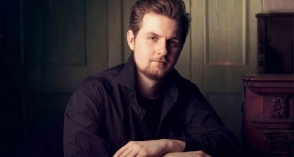Baritone Roman Hoza finished his studies on Janáček’s Academy of Performing Arts Brno in the class of Z. Šmukař and an internship at the Universität für Musik und Darstellende Kunst in Vienna in the class of o.Univ.Prof. M. Klaushofer. He also attended a number of international courses of world-known soloists like G. Beňačková, S. N. Brzakovic, H. Deutsch, P. Dvorský, J. P. Fouchecourt, T. Krause, Ch. Ludwig, P. Mause, A. Plachetka or E. Tubb. He is a laureate of the Antonín Dvořák’s International Vocal Competition, International Competition Ad honorem Mozart, International competiton of chamber and sacred music, Dušek’s competition of musical youth etc. During his studies in Vienna Roman Hoza sang Leporello in Schlosstheater Schönbrunn and before he performed in many roles in The Chamber Opera of Janáček’s Academy, such as Eugen Onegin, Don Giovanni, Guglielmo (Cosi fan tutte), Mamma Agata (Viva la Mamma), Don Parmenione (Rossini: L’occassione fa il ladro), Tomeš (Smetana: The Kiss) and others.
Roman Hoza made his debut in National theatre Brno in 2011 as Papageno in Papageno spielt auf der Zauberflöte and performed here also as Konečný in Janáček’s opera Destiny. He was a guest in Silesian theatre Opava (Bartolo in Barbiere di Siviglia, Guglielmo in Cosi fan tutte). In the summer 2014, Roman Hoza appeared on the prestigious Salzburg Festival in La Cenerentola for children (Dandini) as a participant of Young Singers Project. In the same year he sang the parts of Hunter and Gamekeeper in Dvořák’s Rusalka in Opera National de Lyon directed by Stefan Herheim.
Since January 2015, Roman Hoza is a member of Deutsche Oper am Rhein Opera Studio in Düsseldorf/Duisburg. You can her him as Marullo (Rigoletto), Cristiano (Ballo in maschera), Morales (Carmen) or Papageno (Kinderzauberflöte) there. Since the season 2015/16 Roman Hoza has been singing the part of Figaro in the National Theatre and the title part of Hamlet (A. Thomas) in National Moravian-Silesian Theatre Ostrava.
He also focuses on early music cooperating with leading orchestras in Czech Republic (Capella Mariana, Collegium 1704, Czech Ensemble Baroque, Musica Florea, Ensemble Inégal or Opera Diversa).
